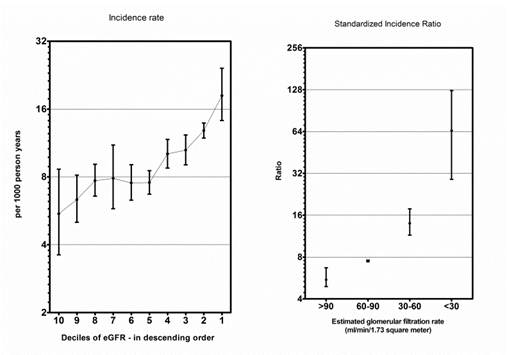Session Information
Session Type: Abstract Submissions (ACR)
Background/Purpose: The kidney is the major organ of urate excretion in humans. Yet, there are few studies that assess whether reduced glomerular filtration and/or kidney damage increases the incidence of gout.
Methods: Seven-year follow up data from the Multiple Risk Factor Intervention Trial, a primary prevention trial for cardiovascular disease among 12,886 men aged 35 to 57 years were analyzed. At each of seven annual visits, participants were assessed for gout by the study physician. Chronic kidney disease was defined as per the National Kidney Foundation guidelines. Standardized incidence ratios (SIR) we computed using data from the Rochester Epidemiology Project. Cox proportional hazards regression analysis was used to assess the association between gout and chronic kidney disease after accounting for the effects of potential confounders (age, race, blood pressure, alcohol and fructose consumption, body mass index, fasting triglycerides, use of aspirin, diabetes status, and diuretic use).
Results: Overall there were 722 cases of incident gout over 76,602 person-years of follow up. The incidence and SIR of gout increased with decreasing eGFR (Figure). The multivariable adjusted hazard ratio for those with chronic kidney disease was 1.9 (1.6, 2.2). Each standard deviation decline in eGFR was associated with a hazard ratio of 1.4 (1.3, 1.5). Addition of serum urate as well as urate-chronic kidney disease interaction term did not attenuate the hazard ratio.
Conclusion: Chronic kidney disease is an independent risk factor for gout. The large magnitude of the metrics of association was not explained by hyperuricemia associated with chronic kidney disease.
Disclosure:
E. Krishnan,
savient,
1,
URL, takeda, metbolex,ARDEA,
2,
METABOLEX TAKEDA,
5;
« Back to 2012 ACR/ARHP Annual Meeting
ACR Meeting Abstracts - https://acrabstracts.org/abstract/glomerular-filtration-rate-chronic-kidney-disease-and-incidence-of-physician-diagnosed-gout/

